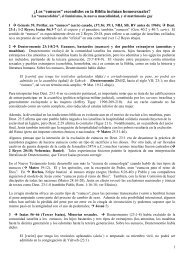Deuteronomy: - Fundación Otras Ovejas de Argentina
Deuteronomy: - Fundación Otras Ovejas de Argentina
Deuteronomy: - Fundación Otras Ovejas de Argentina
You also want an ePaper? Increase the reach of your titles
YUMPU automatically turns print PDFs into web optimized ePapers that Google loves.
1.5 Widow/s (`almanah/oth; 10:18; 14:29; 16:11,14; 24:17,19-21; 26:12-13; 27:19; 11 veces). � Ex.<br />
22:22, 24; � 2. Poor and oppressed, above; � Tamar en Gen. 38:11, 14, 19; Lev. 21:14; 22:13).<br />
<strong>Deuteronomy</strong> contains many more references to orphans and widows (11 times) than any other legal co<strong>de</strong> in the<br />
Hebrew Bible (cf. two in Exodus and two in Leviticus; Elijah and Elishah in � 1-2 Kings, five references). As<br />
Frank Frick points out, biblical studies have overlooked this subject; 16 even the six-volume Anchor Bible<br />
Dictionary (1992) 17 contains no article on widows (� 1 Tim. 5:3-16). In <strong>Deuteronomy</strong>, nine out of eleven<br />
references to orphans and widows occur in contexts along with immigrants, all types of vulnerable and commonly<br />
oppressed classes (� Ex. 22:22,24), whom Yahweh and his people must <strong>de</strong>fend from injustice (Deut. 10:18; 14:29<br />
+ Levites; 24:17, see 18, 19-21; 26:12-13 + Levites; 27:19). In Deut. 16:11, 14, widows also occur in lists along<br />
with orphans, immigrants and Levites + slaves, i.e. groups which should rejoice in the feast of weeks (16:11) and<br />
tabernacles (16:14) that celebrate the goodness of Yahweh, the liberating God of the Exodus.<br />
1.6 Deut. 26:5-9, the Hebrew Bible‘s ―Apostolic Creed‖. 18 Reading the Hebrew Bible, it becomes clear<br />
that the theme of God Creator occurs quite less often—and then mostly in late texts such as � Second Isaiah and<br />
Job—whereas liberation from oppression, the theme of the Exodus, turns out to be the fundamental theme. Thus,<br />
<strong>Deuteronomy</strong> 26:5b-10a, the Hebrew Bible‘s ―Apostolic Creed‖ (Gerhard von Rad) never refers to creation, but<br />
rather gives classical expression to the paradigm of the Exodus: the oppression of the Israelites as slaves in Egypt,<br />
their liberation and the divine gift of land. 19 Every year, in the feast of first harvest, the Israelites confessed:<br />
A wan<strong>de</strong>ring Aramean [see 2.2 ger above] was my ancestor;<br />
he went down into Egypt and lived there as an alien (gur), few in number,<br />
and there he became a great nation, mighty and populous.<br />
When the Egyptians treated us harshly and oppressed (`anah) us, by imposing hard labor<br />
on us, we cried to Yahweh, the God of our ancestors;<br />
Yahweh heard our voice and saw our poverty [`ani], our toil, and our oppression lakhats].<br />
Yahweh brought us out of Egypt with a mighty hand and an outstretched arm,<br />
with a terrifying display of power, and with signs and won<strong>de</strong>rs;<br />
And he brought us into this place and gave us this land, a land flowing with milk and honey.<br />
So now I bring the first of the fruit of the ground that you, Yahweh, have given me. (Deut. 26:5b-10a)<br />
This creed reveals the fundamental place occupied by oppression in the experience of the Israelites and in biblical<br />
theology. The Hebrew Bible points out many possible causes for poverty. However, the only cause proclaimed in<br />
an official formulation every year by ―orthodox‖ believers was oppression. This was one of the fundamental<br />
doctrines. There was no notion that poverty might be the result of some mental, racial, or ―un<strong>de</strong>r-<strong>de</strong>veloped‖<br />
inferiority. 20 The Israelites‘ annual repetition of their ―Apostolic Creed‖ impressed this truth on them, freeing them<br />
from inferiority complexes. This Exodus paradigm runs through the whole book of <strong>Deuteronomy</strong> as a leitmotif,<br />
providing the principal theme for the commandments: as a prologue to the Ten Commandments (Deut. 5:6 // Ex.<br />
20:1-2), and to promote liberating justice and loving solidarity for the Levites (Deut. 16:11; 24:8-9; 26:11-13), the<br />
slaves (16:11-12; 24:18, 22), the immigrants (10:18-19; 16:11; 26:11-13), the orphans and the widows (10:18;<br />
16:11; 24:17, 20-21; 26:12-13); � see the same structure in the New Testament, 1 John 4:9-11); � Exodus, the<br />
name of Yahweh, the liberating God of the Exodus.<br />
1.7 Liberating justice. In addition to liberation and freedom celebrated as norms within the Exodus<br />
paradigm, even more so than loving solidarity, <strong>Deuteronomy</strong> points out liberating justice (mishpat, tse<strong>de</strong>q,<br />
tse<strong>de</strong>qah) as a foundation of the new society—10:17-19, mishpat for the orphans, the widows, the immigrants;<br />
24:10-13, tse<strong>de</strong>qah in the process of making loans to the poor; 1:16-18; 16:18-20, just judges who do not let<br />
themselves be bribed. (See 1:16; 4:8; 6:25; 9:4-6; 16:18-20,20; 24:13; 25:1,1,15,15; 32:4; 33:19,21; tsdq, tsadiq,<br />
tse<strong>de</strong>q, tse<strong>de</strong>qah, total of 18 times.) 21 The prohibition of not moving landmarks (property limits) guaranteed that<br />
the original, just distribution of land could be maintained (19:14; 27:17). But for landless immigrants and for day<br />
laborers, who had lost their land, <strong>Deuteronomy</strong> also provi<strong>de</strong>d for a means of justice. (Concerning the word sakir,<br />
9

















